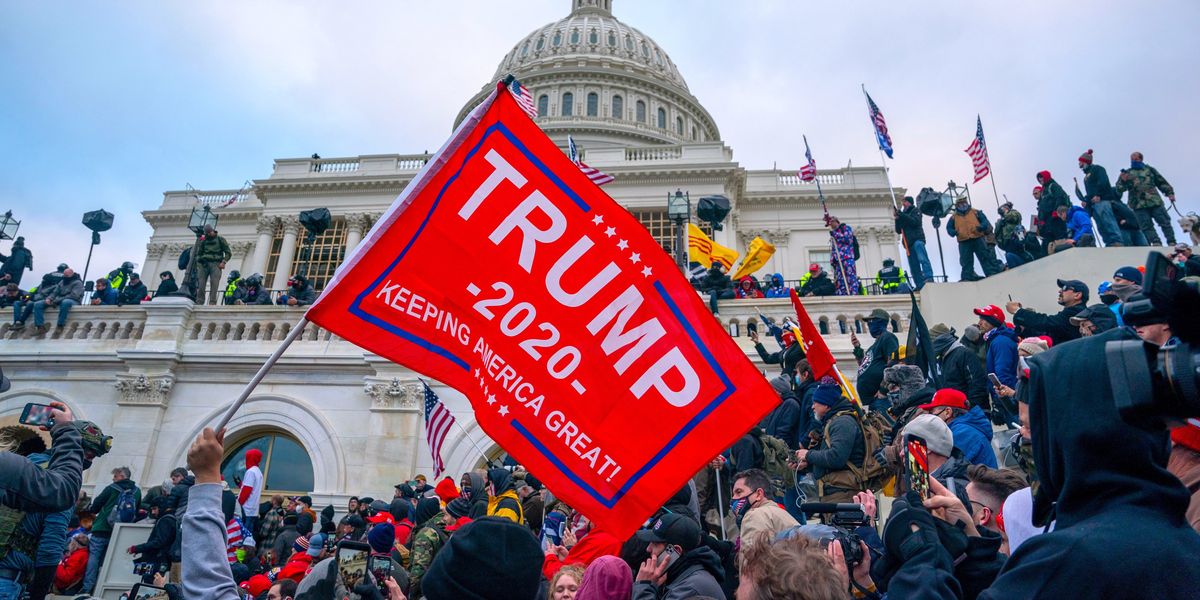I definitely feel that tribalism. That said, I’m shocked that thinking about death increased the likelihood that progressives would vote for Trump. That seems crazy.
Also, I’m not optimistic that knowing something is coming means we’ll be better prepared for it. Remember this pesky little global pandemic we’re in?
I do understand the idea that existential fear can lead to violence. If I truly believed that the democracy was at stake and that all of the legal avenues were exhausted, I can definitely contemplate avenues that I wouldn’t have contemplated previously. I think that the average Republican voter is being purposefully misguided into that by their party.
I think that’s what makes the Republican party so egregious… they trap their audiences in these echo chambers, radicalize them and then downplay the Nazi flags and mass shootings as a few bad apples. However hate and antagonizing others is being shown to be the likely outcome for any being that has been fed a steady diet of existential angst and conspiracies.
Text of the article:
As the 2024 U.S. presidential election approaches, we can expect tensions between the political left and right to intensify. That being said, it’s essential to understand the psychological forces at play that may predict a rise not just in disagreement, but in violence. The social psychology theory known as terror management theory offers a powerful lens through which to view the growing polarity and potential hostility, and how that could manifest as violence depending on what happens with Donald Trump — legally and politically — in the coming year. Terror management theory explains how existential terror — the fear provoked by anything seen as a threat to one’s existence — motivates us to adopt cultural worldviews. Examples of cultural worldviews are religions, national identities and political ideologies. To keep our fear in check, we often cling to philosophies that make us feel safe and give us a sense of purpose amid chaos and uncertainty. Terror management theory is particularly relevant to current political events because it provides a scientific explanation for tribalism. The theory suggests that in the face of threat or fear, we bolster our worldviews, and become more ideological. We also become more tribal, which will strengthen our support for like-minded others, while at the same time making us more prone to aggression toward those who are not like us, and who do not share our worldview. This is precisely what studies have shown. A particularly amusing experiment demonstrated this by weaponizing hot sauce. Scientists divided students into two groups and tasked them with writing an essay — either about their own death or a neutral, non-threatening topic. The students were then introduced to someone who either disparaged or respected their political views, and then asked to choose the amount of mouth-burning hot sauce this person would have to consume. Consistent with the hypothesis of terror management theory, participants induced with existential terror wanted to punish those with an opposing worldview with more hot sauce. The control group did not. While this study was designed to be completely safe, the results suggest that, in real life, the same psychological effect could lead to actual violence, and likely does all the time. ADVERTISEMENT A more disturbing terror management theory study conducted with Iranian and U.S. college students found similar results. One group was instructed to ponder their physical death and describe the ensuing emotions, while the control group was given analogous questions related to dental pain. The results were revealing: Iranian students contemplating death were more supportive of martyrdom attacks against the U.S., while those in the control group opposed them. Similarly, existential fear led U.S. conservative students to endorse severe military attacks on foreign nations that would kill large numbers of civilians. Through these studies, one can clearly see how fear and polarization can strengthen nationalism, exacerbate bias against other groups and fuel hostile behavior. Not only does existential fear increase tribalism and aggression, we also know that it can directly increase support for Trump, who is again seeking the Republican presidential nomination after losing the presidency in 2020.
Then-President Donald Trump rallies with attendees at the 2019 Teen Student Action Summit hosted by Turning Point USA at the Marriott Marquis in Washington, D.C. Photo: Gage Skidmore In a study at the College of Staten Island, 152 students were split into two groups. Similar to the previous example, one group was exposed to exercises triggering thoughts about death, while the other underwent similar exercises about pain. Afterward, both groups were questioned about their support for Trump and their likelihood of voting for him in the coming election. The results were telling: the group primed with death-related thoughts showed increased support for Trump, irrespective of their initial political leanings. This suggests that an atmosphere of existential fear would simultaneously promote aggression while strengthening support for Trump, who regularly projects a “strongman” image and suggests violence as a remedy to political matters. This is a very scary combination of psychological effects. For this reason we must be aware of this problem, which will become increasingly salient as the 2024 presidential election begins to heat up. How do we know that the threat is real — that this is not just more fear mongering? I would argue that we have already seen the dynamic that terror management theory describes in action. Heather Heyer, a counter-protester protesting the Unite the Right rally held in Charlottesville in 2018, was run over by a white supremacist, and 19 others were injured. In 2020, a man drew a hunting bow on protestors in Salt Lake City before being taken out by the crowd, a chilling moment that was captured on video. And on the day of the Capitol riot — a collective display of Trump-inspired aggression — a pipe bomb was found a few blocks from the Capitol building. Earlier this month, purported Ku Klux Klan members threatened LGBTQ activists with guns at a peaceful rally in Kentucky. Now that the election is on the horizon, we can expect similar events to transpire. For example, what will the response from Trump supporters be if their political messiah is found guilty on a charge that warrants prison time? What if Democrats attempt to ban Trump from running for president over his legal issues? What if he is allowed to run again but loses? What might we expect if Trump rallies his loyal troops and commands them to retaliate? Is another Jan. 6 attack inevitable? Is one that’s even more destructive possible? It’s not just the cult of Trump we have to worry about, though. The left is not immune to the effects of existential fear, and there is no doubt that we are seeing increased tribalistic behavior among liberals, too. This means that conscious effort must be taken to keep cool, calm and collected as our fear centers are activated and we inevitably become prone to aggression, be it written, verbal or physical. To use Newton’s third law as a metaphor — for every action, there is an equal and opposite reaction. Since aggression from one side provokes fear and aggression among the other side, a dangerous feedback loop gets created, which will continue to divide the nation to such a degree that something like a civil war emerges. It may be a “cold civil war,” but such a development would almost assuredly result in violence, destruction and death. As we stride toward an uncertain future, it’s crucial that we understand and educate the public about the psychological dynamics at play at both the individual and collective level. A keen awareness of the cognitive factors contributing to our emotional and tribal responses can cultivate more conscious decision-making and potentially diffuse the threat of aggression and violence. So, we must be empathetic during these times, but we must also be vigilant. If we stay on the current trajectory of increasing polarization, we can almost be certain that a whole new level of unrest is headed our way. Now the question is whether we have the ability to use this knowledge to avert the coming train wreck. But I’m an optimist, and I think if we can predict something ahead of time, we can figure out how to prevent it. That is precisely why science has been such a powerful force for human civilization, and it’s time we start applying that knowledge to solving the existential threat that is the culture war in America.
Bobby Azarian is a cognitive neuroscientist and the author of the book The Romance of Reality: How the Universe Organizes Itself to Create Life, Consciousness, and Cosmic Complexity. He is also a blogger for Psychology Today and the creator of the Substack Road to Omega. Follow him on Twitter and Instagram @BobbyAzarian.
Try using reader mode in your browser (the little rectangle with horizonal lines on it next to the URL). You may need to click refresh. But also, maybe keep this tip on the DL because sites are already starting to catch on and block it.
Bummer the article is pay to read :/
Sorry about that. The paywall didn’t appear for me; must be my ad-blocker doing some good for a change.
Here’s a tip: if you ever run into a paywall, feed the URL into 12ft.io. Here’s the link with the paywall removed.





